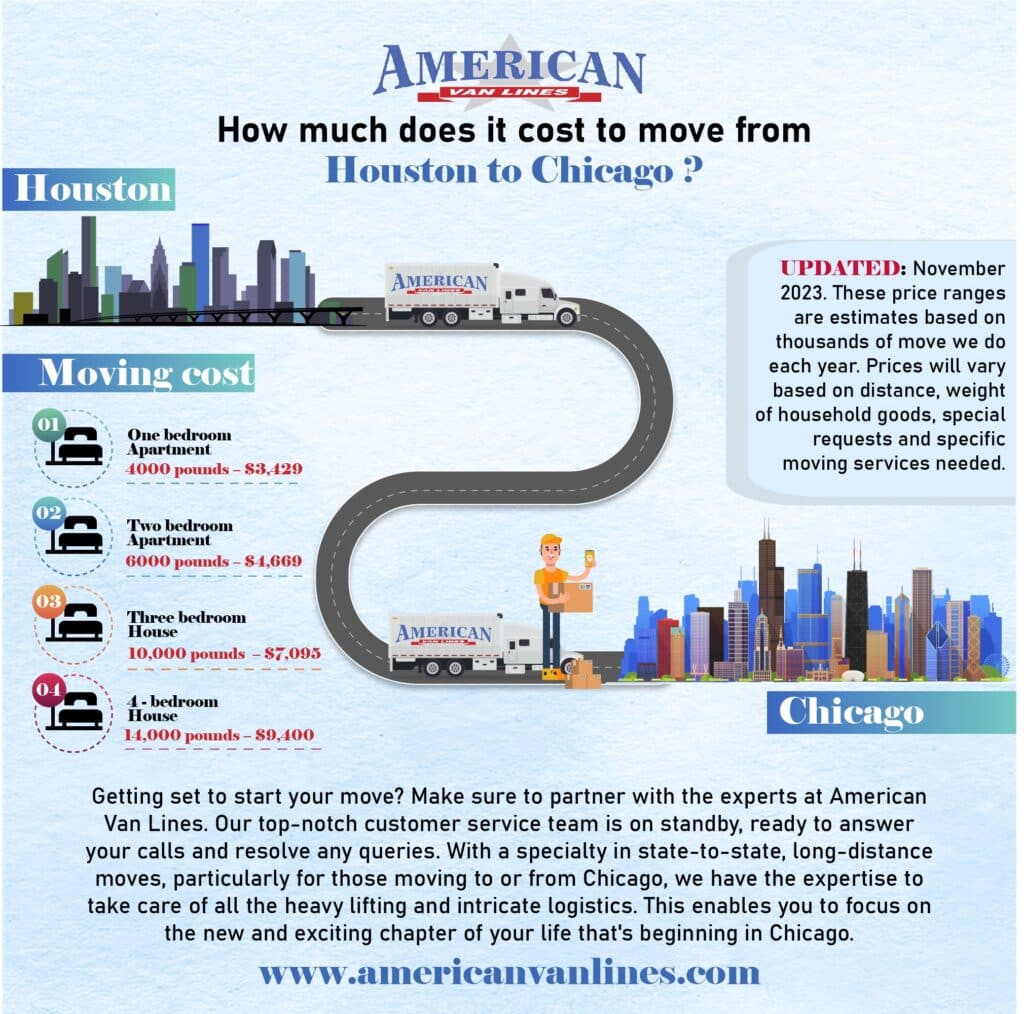Moving From Texas To Chicago
Relocating from the heart of the Lone Star State to the Windy City can be a daunting task. Leaving behind the warm Texan hospitality and vast open spaces, you'll be trading in your cowboy boots for a pair of snow boots as you adapt to the crisp Midwestern climate. From the vibrant cultural scenes to the differing accents, Chicago offers a unique urban experience that's worlds apart from Texas. As you prepare to make this significant move, it's essential to be aware of the logistical and lifestyle changes that come with calling Chicago home.

- Embracing the Midwest: A Guide to Moving from Texas to Chicago
- Is it cheaper to live in Texas or Chicago?
- Is it a good idea to move to Chicago?
- How much is it to move from Texas to Chicago?
- What is the best state to move to from Texas?
- FAQ
- What are the main differences I should expect when moving from Texas to Chicago?
- How do I navigate the job market in Chicago as a Texas transplant?
- What are the best neighborhoods for a Texas transplant to live in Chicago?
- How do I get around Chicago as a Texas transplant who's used to driving everywhere?
Embracing the Midwest: A Guide to Moving from Texas to Chicago
Moving from Texas to Chicago can be a significant change, but with the right mindset and preparation, you can make the most of this exciting opportunity. Here's what you need to know to make a smooth transition:
Climate Adjustments: From Texan Heat to Chicago Chill
One of the most significant differences you'll notice when moving from Texas to Chicago is the climate. Texas is known for its hot summers, while Chicago is infamous for its cold winters. Be prepared for frigid temperatures, snowfall, and potential polar vortexes. Pack warm clothing, including a heavy coat, gloves, and a hat, and invest in a good pair of snow boots. On the plus side, Chicago's climate allows for beautiful seasonal changes, with vibrant autumn colors and mild springs.
Cultural Shifts: From Cowboy Boots to Deep-Dish Pizza
Texas and Chicago have distinct cultural identities. Texas is known for its cowboy culture, BBQ, and country music, while Chicago is famous for its jazz, blues, and deep-dish pizza. Be prepared to adapt to a more fast-paced urban lifestyle, with a diverse range of cultural attractions, restaurants, and events. You may need to trade in your cowboy boots for a pair of comfortable walking shoes, but you'll find plenty of opportunities to explore and discover new experiences.
Job Market and Cost of Living: A Midwest Perspective
The job market in Chicago is diverse, with major industries in healthcare, finance, and technology. While the cost of living in Chicago is higher than in many parts of Texas, the city offers a range of affordable neighborhoods and a relatively low cost of living compared to other major US cities. Research different neighborhoods and find one that fits your budget and lifestyle.
Texas to Chicago: A Guide to Transportation
Getting around Chicago is relatively easy, with a comprehensive public transportation system, including buses and trains. You may need to trade in your car for a Ventra card, but you'll find that the 'L' train is an efficient way to navigate the city. If you do need to own a car, be prepared for traffic and parking challenges, but there are also plenty of bike-friendly routes and car-sharing services available.
Homesick No More: Finding Your Texas Fix in Chicago
Homesickness is a common phenomenon when moving to a new city. But fear not, Chicago has a thriving Texas expat community, with numerous groups and events celebrating all things Texan. From Texas-style BBQ joints to country music bars, you'll find plenty of ways to get your Texas fix in Chicago.
| Category | Texas | Chicago |
|---|---|---|
| Climate | Hot summers, mild winters | Cold winters, mild springs, and autumns |
| Culture | Cowboy culture, BBQ, country music | Jazz, blues, deep-dish pizza, urban culture |
| Job Market | Energy, healthcare, technology | Healthcare, finance, technology, diverse industries |
| Cost of Living | Relatively low | Higher than in many parts of Texas, but lower than in other major US cities |
| Transportation | Car-dependent | Comprehensive public transportation system, walkable neighborhoods |
Is it cheaper to live in Texas or Chicago?

The cost of living in Texas versus Chicago depends on various factors, including lifestyle, housing, food, transportation, and personal preferences. Here's a breakdown of the costs to help you decide:
Housing Costs
Housing costs vary significantly between Texas and Chicago. The median home price in Texas is around $240,000, while in Chicago, it's around $340,000. Rentals also differ, with the average rent for a one-bedroom apartment in Texas being around $1,100 per month, compared to $1,800 per month in Chicago.
- Average rent for a 3-bedroom apartment in Texas: $1,400 per month
- Average rent for a 3-bedroom apartment in Chicago: $2,500 per month
- Texas has a lower property tax rate, with an average effective property tax rate of 1.86%, compared to Chicago's 2.25%
Food and Transportation
Food prices are relatively similar in both states, with some variations depending on the specific location. However, transportation costs differ significantly. Texas has a lower gas tax rate, which means lower fuel costs. Additionally, Texas has a more extensive highway system, making it easier to get around without relying on public transportation.
- Average cost of a meal in a mid-range restaurant in Texas: $15 per person
- Average cost of a meal in a mid-range restaurant in Chicago: $18 per person
- Gallon of gas in Texas: $2.20, compared to $2.90 in Chicago
Taxes and Insurance
Taxes and insurance costs also vary between Texas and Chicago. Texas has no state income tax, while Chicago has a relatively high state income tax rate. Insurance costs, including health and auto insurance, are generally lower in Texas.
- Texas has no state income tax, while Chicago's state income tax rate is 4.95%
- Average annual health insurance premium in Texas: $5,300, compared to $6,300 in Chicago
- Average annual auto insurance premium in Texas: $1,200, compared to $1,600 in Chicago
Is it a good idea to move to Chicago?

Pros of Moving to Chicago
Moving to Chicago can be a great idea for many reasons. One of the biggest advantages is its strong economy, with a diverse range of industries, including finance, healthcare, and technology. This diversity creates a wide range of job opportunities, making it an attractive location for professionals. Additionally, Chicago is a world-class city, with a rich cultural scene, featuring numerous museums, theaters, and music venues. The city's vibrant atmosphere and stunning architecture make it a great place to live and explore.
- Chicago has a diverse range of industries, including finance, healthcare, and technology.
- The city has a strong economy, with many job opportunities available.
- Chicago is a world-class city, with a rich cultural scene and stunning architecture.
Cons of Moving to Chicago
While moving to Chicago can be a great idea, there are also some potential downsides to consider. One of the biggest drawbacks is the high cost of living, with expensive housing, food, and transportation costs. Additionally, Chicago is known for its harsh winters, with cold temperatures and heavy snowfall, which can be challenging for some people. Furthermore, the city has a high crime rate in some areas, which can be a concern for safety.
- Chicago has a high cost of living, with expensive housing, food, and transportation costs.
- The city experiences harsh winters, with cold temperatures and heavy snowfall.
- Chicago has a high crime rate in some areas, which can be a concern for safety.
Things to Consider Before Moving to Chicago
Before making the decision to move to Chicago, there are several things to consider. One important factor is the neighborhood, as some areas are safer and more desirable than others. It's also important to research the commute, as traffic in Chicago can be heavy, and public transportation may not be available in all areas. Additionally, it's essential to prepare for the weather, with warm clothing and a plan for dealing with the cold winters.
- Research the neighborhood, as some areas are safer and more desirable than others.
- Consider the commute, as traffic in Chicago can be heavy, and public transportation may not be available in all areas.
- Prepare for the weather, with warm clothing and a plan for dealing with the cold winters.
How much is it to move from Texas to Chicago?

The cost of moving from Texas to Chicago can vary greatly depending on several factors, including the size of your household, the distance, and the type of services you require. On average, a long-distance move from Texas to Chicago can cost anywhere from $2,000 to $5,000 or more.
Factors Affecting the Cost of Moving
The cost of moving from Texas to Chicago is influenced by several factors, including:
- Distance: The farther you move, the more expensive it will be. Texas to Chicago is approximately 960 miles, which is considered a long-distance move.
- Weight and volume of belongings: The more you have to move, the more it will cost. This includes the weight and volume of your furniture, boxes, and other items.
- Type of services: Do you need packing services, storage, or specialty item handling? These additional services can increase the overall cost of your move.
Types of Moving Services and Their Costs
There are several types of moving services to choose from, each with its own cost structure:
- Full-service moving: This type of move includes packing, loading, transporting, and unloading your belongings. The cost can range from $3,000 to $6,000 or more.
- Partial moving: With this option, you pack your belongings, and the moving company loads, transports, and unloads them. The cost can range from $2,000 to $4,000 or more.
- DIY moving: You pack, load, and transport your belongings yourself, often using a rental truck. The cost can range from $1,000 to $3,000 or more, depending on the distance and size of your household.
Additional Costs to Consider
In addition to the cost of the move itself, you should also consider the following expenses:
- Fuel costs: If you're driving a rental truck or your own vehicle, you'll need to factor in fuel costs for the trip.
- Accommodations and food: You may need to pay for hotel rooms and meals during your trip.
- Travel costs: If you need to travel to Chicago before the move, you'll need to factor in the cost of flights, hotels, and other travel expenses.
What is the best state to move to from Texas?

The best state to move to from Texas largely depends on personal preferences, career goals, and lifestyle requirements. However, here are some top contenders:
Job Opportunities and Economic Growth
When considering a move from Texas, it's essential to think about job opportunities and economic growth. Some states offer more promising prospects than others. For instance:
- Washington state is a hub for tech giants like Amazon and Microsoft, making it an attractive option for those in the industry.
- Colorado is home to a thriving startup scene, with many companies in the cannabis, outdoor recreation, and tech sectors.
- Florida is a popular destination for those in the tourism and hospitality industries, with many job opportunities in cities like Miami and Orlando.
Cost of Living and Affordability
The cost of living in Texas is relatively low compared to other states. If you're looking for a similar or more affordable lifestyle, consider:
- Oklahoma has a lower cost of living than Texas, with affordable housing and lower taxes.
- Arkansas offers a low cost of living, with cheaper housing and lower grocery prices.
- Tennessee has a relatively low cost of living, with no state income tax and affordable housing options.
Quality of Life and Leisure Activities
If you're looking for a change of pace or a more relaxed lifestyle, consider states that offer:
- Oregon is known for its outdoor recreation opportunities, with numerous parks, hiking trails, and scenic coastlines.
- Azizona offers a more laid-back desert lifestyle, with plenty of opportunities for outdoor activities like hiking and golfing.
- North Carolina has a more relaxed atmosphere, with a mix of urban and rural areas, as well as access to the Blue Ridge Mountains.
FAQ
What are the main differences I should expect when moving from Texas to Chicago?
When moving from Texas to Chicago, you should expect significant differences in climate, cost of living, and culture. Texas is known for its hot and dry desert climate, while Chicago has a humid continental climate with cold winters and hot summers. The cost of living in Chicago is generally higher than in Texas, with higher taxes, housing costs, and food prices. Additionally, Chicago has a more fast-paced and urban lifestyle, whereas Texas has a more laid-back and rural vibe. You should also be prepared for differences in accents, food, and sports teams. Chicagoans have a distinct Midwestern accent, and the city is famous for its deep-dish pizza and hot dogs, whereas Texans are known for their BBQ and Tex-Mex cuisine. Lastly, be prepared to switch your allegiance from the Cowboys to the Bears, and from the Astros to the Cubs!
Navigating the job market in Chicago as a Texas transplant requires research, networking, and flexibility. Update your resume to highlight your transferable skills and tailor it to the Chicago job market. Leverage your professional network by reaching out to former colleagues and friends who may have connections in Chicago. Attend job fairs and networking events to meet people in your industry and learn about job opportunities. Be open to taking on a contract or freelance role to gain experience and build your network in the city. Additionally, consider working with a recruiter or staffing agency that specializes in your field to help you find job openings. Lastly, be prepared to adapt to the Midwest work ethic, which may be different from what you're used to in Texas.
What are the best neighborhoods for a Texas transplant to live in Chicago?
The best neighborhoods for a Texas transplant to live in Chicago depend on your lifestyle, budget, and commute preferences. If you're looking for a more suburban feel, consider neighborhoods like Lincoln Park, Lakeview, or North Center, which offer easy access to parks, restaurants, and public transportation. If you prefer a more urban lifestyle, neighborhoods like Wicker Park, Bucktown, or Logan Square offer a vibrant arts and culture scene, as well as trendy bars and restaurants. For a more affordable option, consider neighborhoods like Avondale, Albany Park, or Portage Park, which offer a mix of housing options and access to public transportation. Lastly, research neighborhoods with a strong Texan expat community, such as West Loop or River North, which may offer a sense of familiarity and community.
How do I get around Chicago as a Texas transplant who's used to driving everywhere?
As a Texas transplant who's used to driving everywhere, you may need to adjust to a more pedestrian-friendly and public transportation-oriented lifestyle in Chicago. While it's possible to own a car in Chicago, it's not necessary, and you may find that public transportation is a more convenient and affordable option. The CTA (Chicago Transit Authority) offers an extensive network of buses and trains that cover most areas of the city. You can use the Ventra app to pay for fares and track your route. Additionally, consider investing in a bike or using ride-sharing services like Uber or Lyft to get around the city. For longer trips, the Metra commuter rail system connects the city to the surrounding suburbs. Lastly, be prepared to walk more and enjoy the city's scenic views and pedestrian-friendly infrastructure.